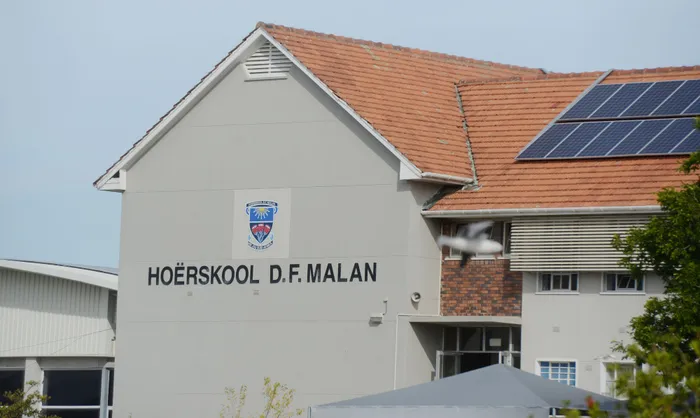
Hoërskool DF Malan may soon have a new name, after the Supreme Court of Appeal dismissed a bid to prevent the school governing body (SGB) from changing it to DF Akademie.
Image: Armand Hough/African News Agency(ANA)
Hoërskool DF Malan has finally received the green light from the Supreme Court of Appeal to change its name to DF Akademie to distance itself from one of the chief architects of apartheid.
The Western Cape High Court earlier dismissed a bid by four parents to prevent the school governing body (SGB) from changing the school's name to DF Akademie.
The SGB years ago officially started the process for the name change, but in 2021, aggrieved by the decision and the proposed new name, four individuals – Barend Hermanus Rautenbach, Johan Smit, Francois Malan, and Barend de Klerk – launched a review application.
After losing that application, they subsequently turned to the SCA.
In upholding the SGB’s decision to change the name of the school, the SCA, in a unanimous judgment, commented: “A public institution’s name often says more about its identity, ethos, and culture than its written mission statement. This is even more so if the institution is named after a controversial historical figure.”
Judge John Smith, who wrote the judgment, added that it is thus unfortunate that more than three decades into the constitutional democracy there are still public institutions which are named after individuals who were instrumental either in the development or implementation of the apartheid ideology.
After the conclusion of a consultative process, the governing body in May 2021 resolved to review the school’s name. That decision was subjected to further investigation into the financial implications of the name change and consequential amendments to its constitution.
Eventually, after further consultation with stakeholders, the governing body resolved to change the name of the school to DF Akademie. That name was thereafter submitted to the provincial department of education for confirmation that no other educational institution had a similar name.
The appellants took umbrage at the decision and, in December 2021, unsuccessfully launched an application in the High Court.
They maintained that the consultative procedure adopted by the governing body was unfair, and the decision itself was irrational. According to them, they had a legal right to object to the name change as the issue concerned a matter of public importance and because they paid school fees for their children who attended the school.
The SCA noted that, given the controversial figure after whom the school was named, it was inevitable that the governing body would sooner or later be pressured into reconsidering the school’s name.
The first such request came from an alumnus who wrote to the governing body in 2018. He described the name as “insensitive and inappropriate” and demanded that the school change its name.
The school received two more letters in a similar tone in September 2019 from a parent of two learners. Subsequently, a group of alumni calling themselves “DF Malan Must Fall” joined the fray.
The arguments by the appellants against the name change included that the consultation process during March 2021, which was facilitated by the steering committee members, did not concern the primary issue of the school’s name.
According to them, it had by then mutated into a debate about “the school we dream of” and the identity of the school. The appellants contended that that procedure was devised to stifle debate about the question of whether the school’s name should be changed. Participants at the discussion groups were therefore not allowed to debate that issue, they argued.
But the SCA found that the decision to change the school’s name was made after a fair and extensive consultative process during which all interested persons were given an opportunity to express a view.
“The name of Dr Malan harks back to the apartheid era, an association that is fundamentally at odds with the school’s ethos of inclusivity and its transformative vision,” the court said.
Cape Times
Related Topics: